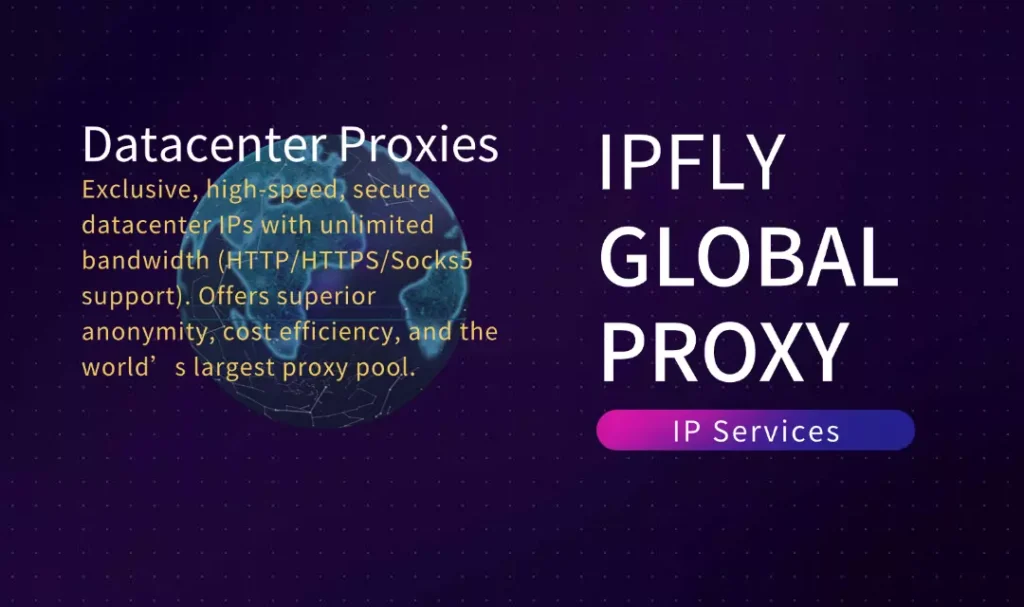As digital ecosystems expand and enterprises face growing demands for speed, security, and online anonymity, the conversation around proxies continues to evolve. While residential proxies and rotating IP pools attract buzz, dedicated datacenter proxies quietly remain an indispensable asset for businesses that prioritize stability and control.
Let’s explore what makes these proxies essential for enterprise workflows, and how businesses use them to maintain secure, high-performance operations.

What Is a Dedicated Datacenter Proxy?
A dedicated datacenter proxy is a static IP address hosted on a high-speed server within a data center. It routes your internet traffic through this IP, masking your real location and ensuring uninterrupted, private access to online resources.
Key features:
- Exclusive IP ownership (not shared with others)
- Fast, consistent connections with low latency
- Fixed geolocation for uninterrupted sessions
- Reliable uptime for data-heavy operations
Why Businesses Still Rely on Datacenter Proxies
✅ Enterprise Security and Privacy
Corporate data operations face growing threats in 2025. Whether conducting competitive intelligence, ad monitoring, or secure account management, having clean, exclusive IP addresses reduces detection risks and keeps sensitive activities private.
✅ Consistent High-Speed Performance
For automation tools, API integrations, or large-scale web scraping, speed and reliability are essential. Unlike rotating IPs, datacenter proxies offer:
- Unrestricted bandwidth
- Fast, stable sessions
- Minimal latency
Perfect for real-time analytics and cloud service access.
When to Choose Datacenter Proxies Over Residential Proxies
While residential proxies are excellent for certain geo-targeted or high-anonymity tasks, datacenter proxies outperform them in:
- High-frequency data scraping
- AI model data collection
- Cloud-based account management
- Load testing and performance audits
They offer unmatched speed, session stability, and fixed IP control — critical for enterprise-grade operations.
Setting Up a Dedicated Proxy: A Quick Overview
To configure a datacenter proxy:
- Acquire your proxy package
- InputIP address, port, and authentication credentials into your tools
- Test connection for speed and reliability
- Deploy within your data scraping software, API client, or network environment
Dedicated Datacenter Proxies vs. Other Proxy Types
| Feature | Datacenter Proxy | Residential Proxy | Mobile Proxy |
| IP Source | Data Center | Real Devices | Cellular Networks |
| Speed | Very Fast | Moderate | Variable |
| Privacy | High | High | Very High |
| Risk of Blacklisting | Low (dedicated) | Moderate | Very Low |
| Ideal for | Web scraping, automation, bulk tasks | Geo-sensitive browsing | Social media, app testing |
The Future of Datacenter Proxies in Enterprise Workflows
Contrary to claims that residential and mobile proxies have eclipsed datacenter solutions, dedicated datacenter proxies remain unmatched for specific high-volume, speed-sensitive operations.
In 2025 and beyond, businesses will increasingly rely on datacenter proxies for:
- AI model training data collection
- Enterprise SEO tracking
- Cloud platform account management
- Internal system testing
How IPFLY Supports Enterprise Proxy Networks

While many providers offer datacenter proxies, few deliver enterprise-grade infrastructure at scale. IPFLY maintains a dedicated network of high-performance datacenter proxies across 190+ countries, supporting secure, high-bandwidth tasks for corporate clients worldwide.
Designed for seamless integration with automation tools, scraping suites, and AI workflows, IPFLY’s proxies offer encrypted, zero-log connections and scalable configurations for growing business needs.
Ready to Strengthen Your Enterprise Infrastructure?
Choose IPFLY’s dedicated datacenter proxies for secure, high-speed, and scalable network solutions. Whether you’re optimizing data pipelines, safeguarding sensitive operations, or managing large-scale automation, our global proxy network is built to support your business-critical demands.



